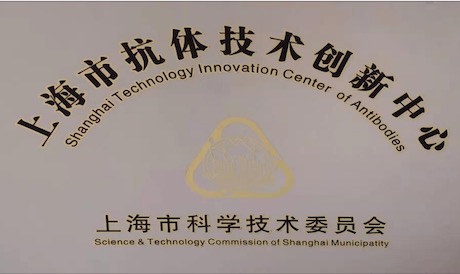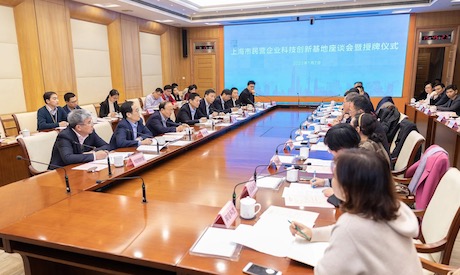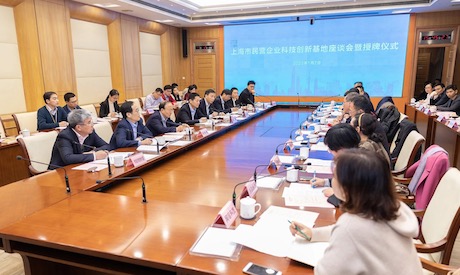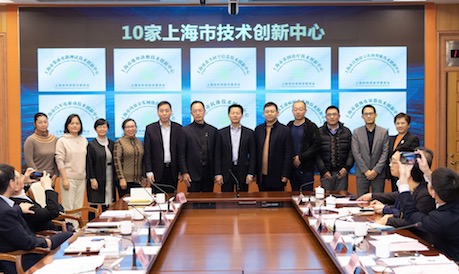On January 2, 2020, a symposium and an awarding ceremony were held for sci-tech innovation bases of Shanghai’s private enterprises. At the symposium, 10 private technology enterprises with outstanding technological achievements were selected to build up 10 technology innovation centers in Shanghai. Among them, Sunshine Guojian Pharmaceutical (Shanghai) Co., Ltd. was selected to build the Shanghai Technology Innovation Center of Antibodies.

At the meeting, vice mayor Wu Qing awarded the certificates to 20 sci-tech innovation bases of private enterprises. The Municipal Science & Technology Commission introduced how the city supported private enterprises to conduct sci-tech innovation and build up sci-tech innovation bases. Representatives from private sci-tech enterprises made their comments respectively, putting forward feasible and targeted suggestions around the theme of the symposium.
In recent years, under the overall arrangement by the municipal Party committee and the municipal government, and in accordance with the instructions by the municipal leaders, the Municipal Science & Technology Commission has unveiled a series of policies and measures to boost the capabilities of major players, develop an innovation ecosystem, and create a fair environment, thus creating favorable conditions for innovation and development of private enterprises.
1 The cultivation system improving gradually
The city has been focusing on the growth needs of private technology enterprises, by creating a support and services chain that cover a range of enterprises including entrepreneurial teams, micro and small technology enterprises, high-tech enterprises, tech small giant (cultivated) enterprises, and outstanding innovation enterprises. In 2019, the city has more than 5,900 high-tech enterprises certificated by the state, and the total number of high-tech and new-tech enterprises has exceeded 12,000.
2 Innovation resources tilted towards enterprises
In recent years, various kinds of talent programs have been promoted to favor enterprises and young talents. Application channels specifically for enterprise-based professionals have been established. For example, talent programs are divided into innovation and entrepreneurship categories, with the latter being oriented towards enterprises. The Science and Technology Youth Star Initiative has set up Class B to support young science talents in enterprises. The Excellent Technology Leader Program has been set up to help develop high-quality technology talent teams in enterprises. At the same time, the city has given priority to the three fields of integrated circuit, artificial intelligence and biomedicine, while organizing private technology enterprises in the city to actively participate in major sci-tech key projects, thus achieving breakthroughs in technological innovation and industrialization.
3 The cost of enterprise innovation and entrepreneurship keeps decreasing
The income tax of high-tech enterprises was reduced by 16.724 billion yuan, and the research and development expenses were deducted by 30.375 billion yuan. At the same time, in terms of institutional transaction costs, the city promoted the reform in the administrative review and approval system for science and technology, cancelled one administrative review and approval item and cleared up 13 existing items. For a total of 11 administrative review and approval items, 100% of applications are processed through the “One Window” online government services platform. Five licenses including the certificates for high-tech achievements transformation projects and high-tech enterprises have been integrated into the city’s e-license database.
4 Accelerating the optimization of innovation and entrepreneurship platforms and carriers
The city has created 15 platforms that integrate R&D and achievement transformation. These platforms have incubated nearly 150 enterprises and teams, leveraged social investment of more than 6 billion yuan, and promote and foster an industrial scale of nearly 10 billion yuan. The city has made efforts to improve the “branding, professionalism, and internalization” of mass innovation spaces, and guide these spaces to boost their service quality and capability. In the city, there are 39 such mass innovation spaces that focus on cultivating enterprises, and 100 such spaces that focus on cultivating and guiding enterprises.
Shanghai is not only an important city of scientific and technological innovation in China, but also a magnet for various scientific and technological innovation bases. According to the statistics of the Ministry of Science and Technology of the People’s Republic of China, Shanghai has more than 100 state-level bases, such as national key laboratories, national engineering technology research centers, national engineering research centers, national clinical medicine research centers, etc. Enterprises are becoming the main players in these bases. Of the 44 national key laboratories in Shanghai, 11 rely on enterprises, of which 2 are private enterprises. Of the 21 Chinese national engineering research centers in Shanghai, 12 rely on enterprises, of which 3 are private enterprises. In addition, there are more than 750 scientific and technological innovation bases across the city, about 20% of which rely on private enterprises for development.


According to the national strategic deployment and requirements, in order to further support the scientific and technological innovation of private enterprises, and optimize the construction of scientific and technological innovation bases in this city, the Municipal Science and Technology Commission has selected a number of industry-leading enterprises with a focus on three fields of integrated circuit, biomedicine and artificial intelligence. After comprehensive research and evalsuation, the city made an overall plan to construct 10 city-level key laboratories and 10 city-level technological innovation centers on a trial basis.
On one hand, the city focused on the improvement of basic scientific research capacity by selecting 10 private sci-tech enterprises with qualified conditions and industry-leading positions to build 10 city-level key laboratories, aiming to guide private enterprises to conduct high-level applied and basic research, promote discipline development, attract and cultivate outstanding sci-tech talents, carry out academic exchanges at home and abroad, and open advanced innovation resources for sharing.
On the other hand, the city focused on technological innovation and transformation of achievements by selecting 10 private sci-tech enterprises with outstanding technological achievements, including Sunshine Guojian Pharmaceutical (Shanghai) Co., Ltd., to build 10 city-level technology innovation centers, aiming to guide private enterprises to meet the innovation needs in key industries, carry out R&D and application of key technologies, offer technical support to industrial innovation and development, and provide innovative services for business incubation and development.

Next, under the leadership of the municipal Party committee and the municipal government, the Municipal Science and Technology Commission will strive to provide guidance and services for the 20 sci-tech innovation bases of private enterprises. The commission will guide and support private sci-tech enterprises in this city to strengthen high-level scientific research and technological innovation, and promote talent cultivation and development of an innovation network that engages businesses, universities and research institutes. The commission will continuously improve the innovation functions and vitality in enterprises, and put impetus into Shanghai’s efforts to speed up the construction of a globally influential science and technology innovation center.